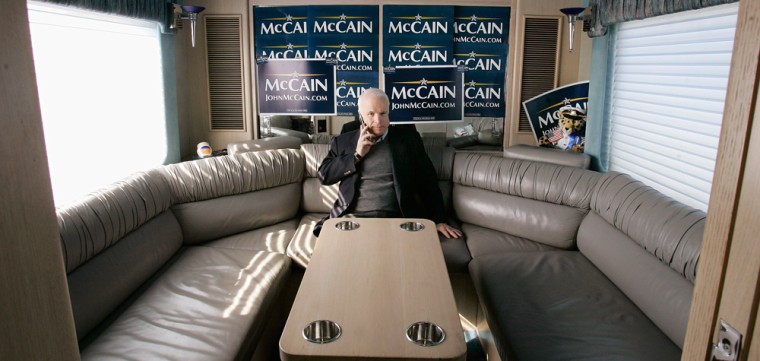Supporters of Sen. Hillary Rodham Clinton's (D) presidential campaign really shouldn't condemn me for this column, which looks at the prospects for a general election matchup between Sens. Barack Obama, D-Ill., and John McCain, R-Ariz.
The way this campaign season has gone, writing a column assuming an Obama nomination might well guarantee that Clinton will miraculously win today's primaries in Texas, Ohio, Rhode Island and Vermont by the 20-plus points she needs to close her delegate deficit.
That's the amusing thing about press coverage the last few days; the fact that so many are touting how close the contests are in Texas and Ohio, while forgetting that "close" only counts in horseshoes and hand grenades.
Winning by slight percentages in Texas and Ohio wouldn't be real wins for Clinton. A "win" would be anything that significantly closes the gap in delegates.
Symbolic victories mean nothing at this point, other than encouraging her to plow ahead in the campaign, amass a greater campaign debt and delay getting on with the next phase of her life.
In an e-mail to friends in the media last week, veteran Republican pollster Glen Bolger commented on the perception that the GOP was badly splintered and not solidly behind McCain, while Democrats were ready to line up behind either Obama or Clinton.
Bolger disagrees with that assessment, and offered up polling his firm had conducted with Democratic pollster Dave Beattie and his firm, Hamilton Campaigns. The research showed that McCain had higher favorable ratings among supporters of former Arkansas Gov. Mike Huckabee than Obama had among Clinton supporters or Clinton had among Obama's backers.
Before I had a chance to read about Bolger's memo, the latest Pew Research Center poll [PDF] was released. The survey of 1,240 registered voters, conducted Feb. 20-24, has a 3.5-point error margin.
When McCain was matched up against Obama, Obama led by 50 percent to 43 percent, but McCain was holding 87 percent of the Republican vote while Obama was winning just 81 percent of the Democratic vote.
When Clinton was pitted against McCain, the former first lady led by 50 percent to 45 percent, but the Arizona senator was getting 91 percent of the Republican vote while Clinton was garnering 89 percent of the Democratic vote. Although these differences are not enormous or even statistically significant, they do indicate that McCain's problem is not uniting Republicans.
In fact, his problem might be that there simply aren't enough Republicans.
Thirty-eight percent of those interviewed by Pew called themselves Democrats, compared with 24 percent who identified themselves as Republicans.
When independent leaners are factored in, Democrats go up to 55 percent, while Republicans rise to 34 percent.
This is a wider gap than in most other polls, but the Democratic advantage commonly runs from 8 points to 14 points. When one party builds up a big advantage in voter identification, it is a huge factor.
McCain's challenge isn't uniting Republicans, Bolger points out -- they are pretty united. He needs to either grow the Republican Party very quickly, which isn't likely to happen between now and November, or do a heck of a lot better among independents. As Bolger put it, independents are the Holy Grail of the 2008 election.
Another primary storyline is that McCain will have a hard time getting the GOP vote out. But this is an argument that many, including yours truly, made about Republicans prior to the 2006 midterm elections. As it turned out, GOP turnout hardly dropped a bit from the previous midterm election, and Democratic turnout was up, but not that much.
Republican voters made up 36 percent of all votes cast in 2006. Democrats accounted for 38 percent in 2006. Republicans lost in the 2006 midterm elections when independent voters moved largely in favor of Democrats.
If Republican voters turned out in November 2006 -- after the scandals surrounding Jack Abramoff and Reps. Mark Foley, R-Fla., Bob Ney, R-Ohio, and Tom DeLay, R-Texas, and when the Iraq war was going very badly -- they will vote any time.
The big risk for Republicans is assuming that McCain will garner pretty much the same number of votes Bush did in 2004. Plus, there's a distinct possibility of Obama dramatically exceeding the number of votes that Kerry won.
In a Feb. 8-10 Gallup/USA Today poll, 79 percent of Democrats reported they were more enthusiastic about voting this year than usual, and only 15 percent said they were less enthusiastic than usual.
Just 44 percent of Republicans said they were more enthusiastic than usual, while 48 percent said they were less enthusiastic. McCain could match the Bush vote totals and still lose if there is a wide enthusiasm gap. That survey of 1,016 adults has a 3-point error margin.
McCain must win the vast majority of independent votes while simultaneously trying to offset the enthusiasm among Democrats. He has his work cut out for him.
